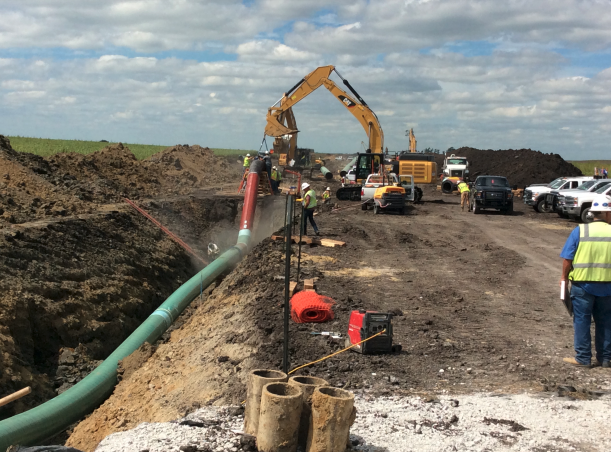
CO2 pipelines are the sewage system for the fossil fuel industry, funded by the public.
Health, Safety, and Regulations
-
Video: CO2 Pipeline Leak, Sulphur, Louisiana Apr. 3, 2024
Local people tell their stories about the CO2 pipeline leak that spewed dangerous CO2 for two hours before the owner (Denbury/ExxonMobil) shut it down.
-
Anaylsis of data on CO2 pipeline "incidents"
The U.S. Pipeline Safety and Hazardous Materials Safety Administration (PHMSA) keeps records (perhaps incomplete) of CO2 pipeline “incidents.” This 2022 study analyzed 113 “incidents” reported between 1994 and 2021. Leakage is the most common “incident.”
-
Historical accidents of CO2 pipelines
This 2023 study analyzed available data (perhaps incomplete) on 112 carbon dioxide pipeline accidents in the U.S., 1994-2021.
-
U.S. Army's Total Regulatory Failure
The U.S. Army Corps of Engineers is pretending that 96,000 miles of new carbon dioxide pipelines will have no impact on the natural environment.
-
How corporations control pipeline safety regulations
Attorney Paul Blackburn reveals how pipeline safety regulations have been structured to keep corporations in the driver’s seat
-
Carbon Pipelines Risks, Threats, Unanswered Questions
Carbon & hydrogen pipelines, supercharged by federal subsidies, threaten communities from the Gulf Coast to California. As California takes steps toward carbon capture & carbon pipelines, what do decision-makers need to know about health & environmental risks? What do you need to know about the risks and the grassroots pushback? Watch this webinar from PSRLA.
-
The Gassing of Satartia, Mississippi
A CO2 pipeline exploded near a small town in Mississippi in 2020, sending dozens of people to the hospital. Journalist Dan Zegart tells the harrowing story in detail.
-
Video: What it was like in Satartia, Mississippi when the CO2 pipeline exploded
In this 60-minute video, emergency responders give first-hand accounts of the CO2 pipeline explosion in Satartia, Mississippi in 2020. The invisible cloud of CO2 extended for 4 miles.
-
U.S. Government issues scathing report on CO2 pipeline explosion in Satartia, Mississippi
The Pipeline and Hazardous Materials Safety Administration (PHMSA) has issued a scathing report on the CO2 pipeline explosion in Satartia, Mississippi in 2020.
-
Fox TV Outlet in South Dakota Reports on Frightening CO2 Pipeline Rupture
Reporter Beth Warden, WSFY-TV in Sioux Falls, SD on Oct. 6, 2022 aired a frightening story about the 2020 CO2 pipeline rupture in Mississippi.
-
Federal regulation of CO2 pipelines is entirely inadequate
This March 2022 report from the Pipeline Safety Trust reveals that federal regulation of carbon dioxide (CO2) pipelines is totally inadequate for protecting the public.
-
CO2 Pipelines: Dangerous & Under-regulated
This fact sheet from the Pipeline Safety Trust tells the story of dangerous and under-regulated carbon dioxide pipelines, with links to other reliable sources of information.
-
Video: Inadequacy of Federal CO2 Pipeline Regulations
Bill Caram, director of the Pipeline Safety Trust, discusses their March 2022 report on the inadequacy of federal regulations for carbon dioxide pipelines.
-
How to strengthen CO2 pipeline regulations
Bill Caram, Executive Director, Pipeline Safety Trust, discusses strategy for strengthening the regulation of CO2 pipelines
-
Government begins small effort to strengthen CO2 pipeline safety
Responding to Dan Zegart’s harrowing story of the CO2 pipeline explosion in Satartia, Mississippi in 2020 and to the Pipeline Safety Trust’s revelation of pathetic pipeline regulations, the government has begun a small effort to strengthen CO2 pipeline safety. There’s still a LONG way to go.
-
How states & counties can regulate CO2 pipelines
Video: Paul Blackburn, attorney with the Bold Alliance and pipeline expert, discusses how states & counties can regulate CO2 pipelines.
-
Video: CO2 Pipeline Rupture Test
This video shows a pipeline rupture test conducted by the Norwegian risk-management company, DNV.
-
Human-Health Effects of CO2
Dr. Ted Schettler, M.D., M.P.H., prepared this fact sheet on the human health consequences of exposure to CO2.
-
Public Health and CO2
This fact sheet was written by Ms. Sheri Deal-Tyne and published by the Iowa chapter of Physicians for Social Responsibility.
-
CO2 Can Kill
A small leak in a CO2 pipeline can release thousands of tons of CO2 gas within seconds, creating an invisible, odorless puddle that hugs the ground, displacing oxygen and asphyxiating everything that remains within the puddle – crops, livestock, wildlife, and humans. Watch this 3-minute video. An invisible, undetectable cloud of CO2 can kill you in your sleep.
-
Video: Pipeline Easements & Taxes
Experts in pipeline law from Bold Alliance discuss pipeline easements and taxes. July 2022.
-
A Basic Fact Sheet about the Safety of CO2 and CO2 Pipelines
This fact sheet answers common questions about the safety of concentrated, pressurized CO2 and CO2 pipelines.
-
State and local governments CAN regulate CO2 pipelines
Pipeline companies proposing dangerous CO@ pipelines claim federal law prevents state and local governments from regulating CO2 pipelines in ANY WAY. In this video, Attorney Paul Blackburn says this is NOT TRUE.
-
Citizens Write to the Army Corps of Engineers about CO2 Pipelines
By law, the Army Corps of Engineers is supposed to protect the waters of the United States. As the nation builds a network of CO2 pipelines (possibly entailing 96,000 miles of pipe [see http://bit.ly/44bKXaJ]), many thousands of rivers, streams and lakes could be affected by construction and operation. However, the Army Corps has decided in advance that those effects are inconsequential, so no environmental reviews or public engagements are planned. Citizens have requested that the Army Corps reverse its decision. Future lawsuits against the Corps cannot be ruled out.